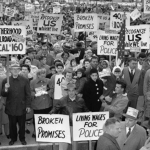
the workers leaving their dream jobs
Last updated on October 15th, 2022 at 06:12 am
Global – For the most part, workers have always hoped for roles that matched their interests and hobbies; Switching from an office job to a coveted sourdough bakery or a fun role at a video game company seems like a no-brainer. However, this “do what you love” narrative has its drawbacks. Many people find that their dream job requires more work in worse conditions. Others find that the industries they idolize trade in the passion of workers to keep wages low. In the face of this pressure, some workers are wondering if their dream job is really worth it.
Keep Reading
Passion vs Pay
These days, more than ever, the idea that happiness and success comes from working in a “cool” job — a role you’re passionate about in an interesting, enviable workplace — is ubiquitous.
According to a survey conducted at the end of 2020 by American freelance exchange Fiverr, 59% of the 2,000 Americans surveyed believe that the Covid-19 pandemic has motivated people to take on their dream jobs. The majority of respondents, 71%, once saw that they would take on their dream job, and 45% believe that this is possible on a permanent basis. But changing career direction to land your dream job may not always work out the way people hope, especially if employers are taking advantage of their employees’ passion.
This practice of exploiting passion is especially noticeable in the creative industries; A 2019 survey found that most creative occupations in the UK, such as journalist, fashion stylist, musician and game designer, are below average annual wages. Unpaid work is commonplace: according to a 2020 survey of UK creatives, 47% of people under 30 said they had completed an unpaid internship to land their dream job. In the same study, 60% of people under 30 said they weren’t paid for all the hours they worked last month. One 2019 study explains why this happens; the study found that people considered mistreatment of workers (such as asking employees to do extra tasks or work more hours without pay) as more legitimate when workers were assumed to be passionate about their work.









